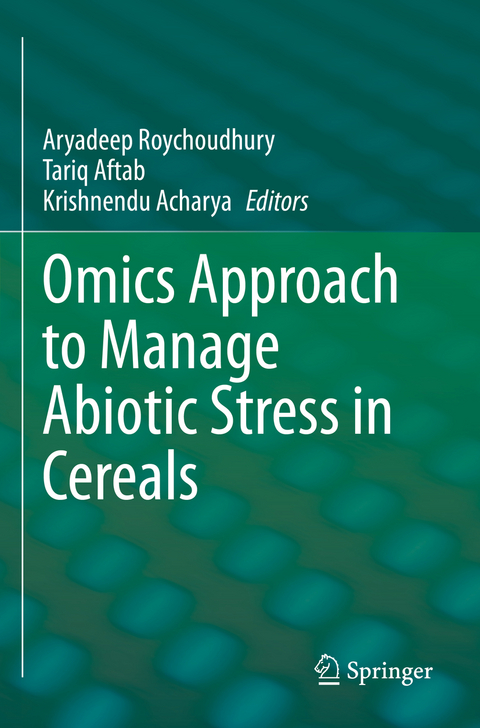
Omics Approach to Manage Abiotic Stress in Cereals
Springer Verlag, Singapore
978-981-19-0142-3 (ISBN)
Dr. Aryadeep Roychoudhury is Assistant Professor at the Department of Biotechnology, St. Xavier’s College (Autonomous), Kolkata, West Bengal, India. He received his B.Sc. (Hons.) in Botany from Presidency College, Kolkata, M.Sc. in Biophysics and Molecular Biology, University of Calcutta, and Ph.D. from Bose Institute, Kolkata, under Jadavpur University. Dr. Roychoudhury is currently handling several government-funded projects on abiotic stress responses in rice. He has published over 200 articles in peer-reviewed journals and as book chapters, and already edited 7 books from reputed publishers. He is the recipient of the Young Scientist Award 2019, conferred upon him by International Foundation for Environment and Ecology, and his name is included in the Stanford University List of World's Top 2% Scientists. Dr. Tariq Aftab received his Ph.D. in the Department of Botany at Aligarh Muslim University, India, and is currently an Assistant Professor there. After completing hisdoctorate, he has worked as Research Fellow at National Bureau of Plant Genetic Resources, New Delhi and as Post-doctorate Fellow at Jamia Hamdard, New Delhi, India. Dr. Aftab also worked as Visiting Scientist at Leibniz Institute of Plant Genetics and Crop Plant Research (IPK), Gatersleben, Germany, and in the Department of Plant Biology, Michigan State University, USA. He has edited a number of books with with international publishers, and published over 50 research papers in international journals. Prof. Krishnendu Acharya is former Head, Department of Botany, University of Calcutta. He obtained his master's degree in Botany from University of Calcutta, M.Tech. in Biotechnology and Ph.D. from Jadavpur University. His career has been marked by numerous awards and achievements. His name has been included in the Stanford List of World's Top 2% Scientists. He has established his research career in diverse fields which involves Macrofungai diversity and medicinal prospects;Innate immunity in plants and Myco-nanotechnology. He has a research experience of over 25 years with more than 350 research publications, 6 books and 4 (3 Applied) patents.
Chapter 1. Morphological, architectural and biochemical modifications of cereal crops during abiotic stress.- Chapter 2. Cereal physiology, flowering and grain yield under salinity and drought stress.- Chapter 3. Physiology, flowering and grain yield under abiotic stress imposed by heavy metals.- Chapter 4. Priming effect in developing abiotic stress tolerance in cereals through metabolome reprograming.- Chapter 5. Understanding abiotic stress tolerance in cereals through genomics and proteomics approaches.- Chapter 6. Metabolome analyses in response to diverse abiotic stress.- Chapter 7. Metabolomic profiling of different cereals during biotic and abiotic stresses.- Chapter 8. Plant breeding strategies for abiotic stress tolerance in cereals.- Chapter 9. Transgenic strategies to develop abiotic stress tolerance in cereals.- Chapter 10. Genetically engineered cereals tolerant to abiotic stress.- Chapter 11. Genome editing and CRISPR-Cas technology for enhancing abiotic stress tolerance in cereals.- Chapter 12. Abiotic stress tolerance in cereals through genome editing.- Chapter 13. Varietal physiology, metabolic regulation and molecular responses of rice genotypes to diverse environmental stresses.- Chapter 14. Breeding and Omics Approaches to Understand Abiotic Stress Response in Rice.- Chapter 15. Genomics and transcriptomics approaches to understand abiotic stress response in rice.- Chapter 16. Biochemical and molecular mechanism of wheat to diverse environmental stresses.- Chapter 17. How microRNAs Regulate Abiotic Stress Tolerance in Wheat? A Snapshot.- Chapter 18. Molecular-genetic studies, breeding and genomics-based approaches to develop abiotic stress tolerance in sorghum.- Chapter 19. MicroRNAs shape the Tolerance Mechanisms against Abiotic Stress in Maize.- Chapter 20. Transcriptome, proteome and metabolome profiling for abiotic stress tolerance in maize and barley.- Chapter 21. Omics tools to understand abiotic stress response and adaptation in rye, oat and barley.- Chapter 22. Genomic tools and proteomic determinants for abiotic stress tolerance in pearl millet (Pennisetum glaucum) and foxtail millet (Setaria italica L.).- Chapter 23. Advancement in Omics Technologies for Enhancing Abiotic Stress Tolerance in Finger millet.- Chapter 24. Buckwheat (Fagopyrum esculentum) response and tolerance to abiotic stress.- Chapter 25. Abiotic Stress Response and Adoption of Triticale.
| Erscheinungsdatum | 11.07.2023 |
|---|---|
| Zusatzinfo | 1 Illustrations, black and white; IX, 615 p. 1 illus. |
| Verlagsort | Singapore |
| Sprache | englisch |
| Maße | 155 x 235 mm |
| Themenwelt | Naturwissenschaften ► Biologie ► Botanik |
| Naturwissenschaften ► Biologie ► Genetik / Molekularbiologie | |
| Technik ► Umwelttechnik / Biotechnologie | |
| ISBN-10 | 981-19-0142-2 / 9811901422 |
| ISBN-13 | 978-981-19-0142-3 / 9789811901423 |
| Zustand | Neuware |
| Informationen gemäß Produktsicherheitsverordnung (GPSR) | |
| Haben Sie eine Frage zum Produkt? |
aus dem Bereich


